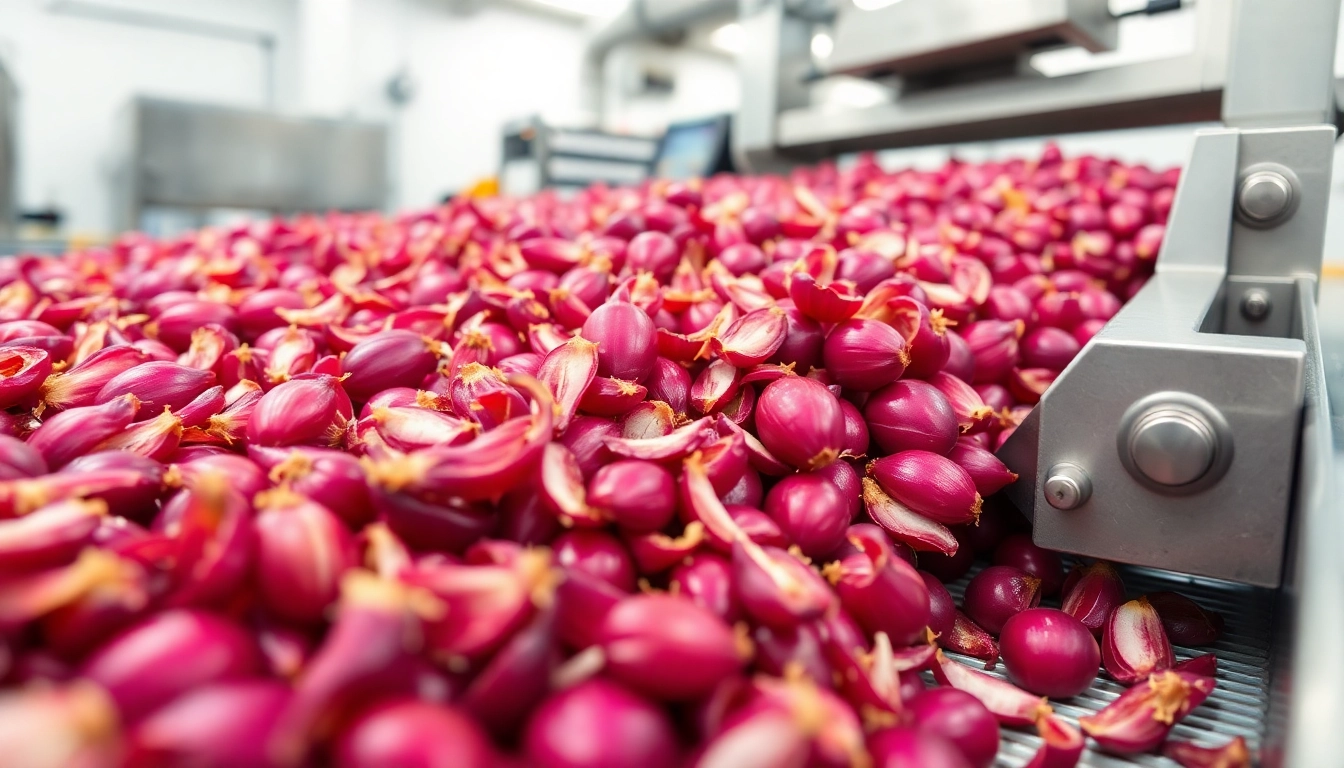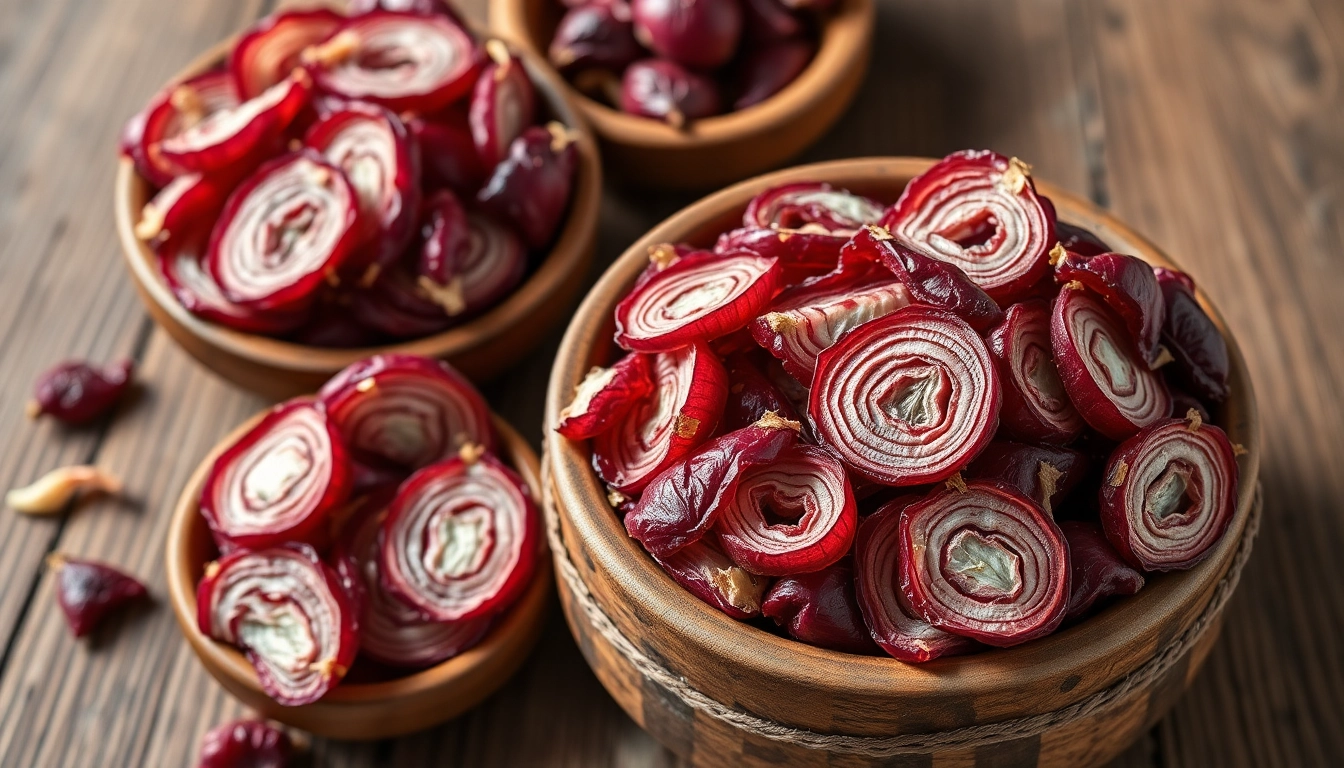Understanding Dehydrated Red Onion and Its Market Demand
Dehydrated Red Onion has become an indispensable ingredient in the global food industry, owing to its rich flavor, extended shelf life, and convenience for food processing. As consumers increasingly favor ready-to-use, natural, and premium ingredients, the demand for dehydrated onion products, especially Dehydrated Red Onion, is on a notable rise. This surge is driven by the need for consistent quality, cost-effectiveness, and ease of storage and transportation, which dehydrated onion offers over fresh counterparts.
From culinary applications in Asia, Middle East, and Europe to industrial uses in food manufacturing, dehydrated onions serve a wide array of purposes. They are vital in flavoring blends, powdered seasonings, snack foods, and even in the condiment industry. Their popularity underscores the importance for businesses and exporters to understand market demand, which is influenced by changing consumer preferences towards natural and organic ingredients, as well as technological advances in dehydration methods.
Basics of Dehydrated Red Onion and Its Uses in Food Industry
Dehydrated Red Onion is produced by removing moisture from fresh red onions through controlled dehydration processes. This process preserves the onion’s essential nutrients, aroma, and color, resulting in a product that retains the authentic taste of fresh onions but with a significantly extended shelf life. The dehydration process involves technologies such as spray drying, freeze-drying, convective drying, and vacuum drying, each suited for different quality and application requirements.
The primary uses in the food industry include ground onion powder for spice blends, flakes for seasoning, and raw slices for instant cooking solutions. Chefs and food manufacturers rely on dehydrated onions to enhance flavors in soups, gravies, sauces, snack foods, and ready-to-eat (RTE) products. Their convenience simplifies supply chain logistics and ensures year-round availability, making them essential in the modern food processing landscape.
Learn more about how dehydrated onion fits into the global supply chain by visiting Dehydrated Red Onion.
Global Market Trends and Consumer Preferences for Dried Onions
The global dried onion market is witnessing robust growth, driven by increasing demand from diverse sectors such as retail, hospitality, and foodservice. Modern consumers are favoring natural, preservative-free ingredients, leading to higher demand for organic dehydrated products. Additionally, the trend toward clean-label foods with minimal artificial additives propels the use of dehydrated onions as a natural flavor enhancer.
Emerging markets in Asia-Pacific and Africa are expanding rapidly, owing to the growing food processing industries and urbanization. In Europe and North America, health-conscious consumers prefer organic and non-GMO dehydrated onions, which influence production standards and certifications. E-commerce platforms and food trade expos have also accelerated market penetration and brand visibility for exporters.
For detailed insights into market dynamics, consider analyzing reports from industry leaders and assessment platforms, which highlight promising opportunities for exporters and manufacturers looking to expand their footprint.
Growth Opportunities in Dehydrated Onion Exports
Export opportunities for dehydrated red onion are driven by various factors, including increasing global demand, technological advances in dehydration processes, and stringent quality standards that create barriers to entry for lesser-quality producers. Countries like India, China, Turkey, and the United States are key suppliers, with India standing out as one of the largest manufacturers and exporters of dehydrated onions.
Exporters can capitalize on certifications such as HACCP, ISO, and organic labels to access premium markets, especially in Europe and North America. Moreover, developing value-added products like flavored onion powders, organic dehydrated onions, and specialty cuts can differentiate offerings and command higher prices.
Building strategic alliances, participating in international food trade fairs, and investing in logistics infrastructure can further strengthen export capabilities. Notably, exploring niche markets like organic, gluten-free, and non-GMO dehydrated onions can yield higher margins and brand loyalty.
Manufacturing Best Practices for Dehydrated Red Onion
Selection and Quality Control of Raw Red Onions
The foundation of high-quality dehydrated red onion lies in selecting the right raw material. Preferred onions are bright red, firm, and free from blemishes or disease. Size uniformity ensures consistent dehydration and processing, minimizing wastage and enhancing product quality. Sorting and grading are essential early steps for maintaining standards.
Rigorous quality control involves testing for moisture content, pulpiness, and pathogen presence. Regular sampling and sensory evaluation—assessing aroma, color, and flavor—align with international standards, ensuring that only the best raw onions proceed to dehydration.
Dehydration Methods and Technology Innovations
Modern dehydration techniques optimize efficiency and product quality. Spray drying offers rapid moisture removal, suitable for onion powders, while freeze-drying preserves flavor and nutrients for premium products. Convective and vacuum drying are more traditional but still widely used due to cost-effectiveness.
Technological innovations like infrared drying, microwave-assisted dehydration, and continuous processing lines further improve productivity and energy efficiency. Automation and real-time monitoring allow producers to maintain precise control over drying parameters, resulting in consistent, high-grade products.
Packaging and Preservation for Export Quality
Packaging plays a critical role in preserving the quality and extending shelf life. Industry standards dictate airtight, moisture-proof, and UV-protected packaging materials, such as laminated pouches, vacuum-sealed packs, or nitrogen-flushed containers. Proper labeling with clear information on batch numbers, expiration dates, certifications, and storage instructions enhances traceability and consumer confidence.
Innovative packaging solutions also include resealable packs and environmentally friendly materials, aligning with sustainable business practices. Ensuring optimal packaging directly impacts export success and customer satisfaction.
Certifications and Quality Assurance in Dehydrated Onion Production
International Standards and Certifications for Export Markets
Meeting international standards is vital to penetrate global markets. Certifications such as HACCP (Hazard Analysis and Critical Control Points), ISO 22000, Organic certifications, and GLOBALG.A.P. affirm product safety and quality compliance. These certifications not only enhance credibility but also facilitate access to stringent markets like the EU, USA, and Japan.
Producers should regularly audit their manufacturing practices and documentation processes to maintain their certifications, demonstrating their commitment to quality and safety.
Maintaining Food Safety and Hygiene Standards
Adherence to hygienic manufacturing environments, proper sanitation, and employee training are critical. Implementing Good Manufacturing Practices (GMP) minimizes contamination and spoilage risks. Regular testing for microbial activity, aflatoxins, and pesticide residues ensures compliance with health regulations.
Employing traceability systems helps track raw material sources and production batches, further enhancing safety protocols and enabling swift action in case of recalls or quality issues.
Traceability and Documentation to Boost Credibility
Accurate documentation of raw material sourcing, processing steps, and quality testing results strengthens the product’s credibility on international markets. Digital traceability systems, such as ERP and blockchain-based solutions, streamline record-keeping, improve transparency, and build trust among buyers.
Effective Distribution and Export Strategies for Dehydrated Red Onion
Identifying Target Markets and Building B2B Relationships
Understanding market requirements, consumer preferences, and import regulations guides strategic targeting. Participating in prominent trade shows such as Biofach, Food & Beverage International Shows, and regional expos helps establish B2B contacts, showcase products, and gain market insights.
Developing strong relationships with importers, distributors, and food processors paves the way for sustained business growth. Tailoring product specifications, packaging, and certifications to meet specific market needs enhances competitiveness.
Trade Show Participation and Industry Networking
Active engagement in industry trade shows and expos provides opportunities for brand visibility, partnership development, and staying abreast of emerging trends. Spice Nest, for example, effectively showcased at Biofach 2024, which significantly boosted its international presence.
Preparing compelling product presentations, samples, and technical documentation maximizes the impact of participation and attracts potential clients.
Logistics, Shipping, and Delivery Optimization
Efficient logistics are paramount to maintaining product quality from factory to customer. Partnering with reliable freight forwarders, choosing appropriate shipping containers, and ensuring proper climate control reduce spoilage and damage.
Streamlined documentation, compliance with import-export regulations, and strategic warehousing further enhance delivery performance and reduce lead times, ultimately benefiting the bottom line.
Innovations and Future Trends in Dehydrated Food Products
Embedding Organic and Natural Labels for Premium Positioning
Consumer preference for organic and natural foods is redefining market offerings. Aligning dehydration processes with organic standards and obtaining organic certifications allow products like dehydrated red onion to command premium pricing. Clear labeling, transparent sourcing, and eco-friendly packaging resonate with health-conscious buyers.
Developing Value-Added Onion Products
Innovations include flavor-infused onion powders, specialty cuts, dehydrated onion rings, and organic variants. Creating tailored products for specific applications—such as gluten-free, vegan, or keto-friendly options—expands market reach.
Investing in R&D and customer feedback helps develop products that meet evolving consumer demands and open higher-margin niches.
Technology Advances Shaping the Dehydrated Food Sector
Automation, IoT-enabled drying equipment, and improved packaging technologies are transforming the sector. These innovations enable high throughput, consistent quality, and reduced energy consumption. Additionally, smart traceability solutions enhance transparency and compliance, fostering consumer trust and regulatory adherence.


